The 2020 Mac Mini Unleashed: Putting Apple Silicon M1 To The Test
by Andrei Frumusanu on November 17, 2020 9:00 AM ESTBenchmarks: Whatever Is Available
As we’ve had very little time with the Mac mini, and the fact that this not only is a macOS system, but a new Arm64-based macOS system, our usual benchmark choices that we tend to use aren’t really available to us. We’ve made due with a assortment of available tests at the time of the launch to give us a rough idea of the performance:
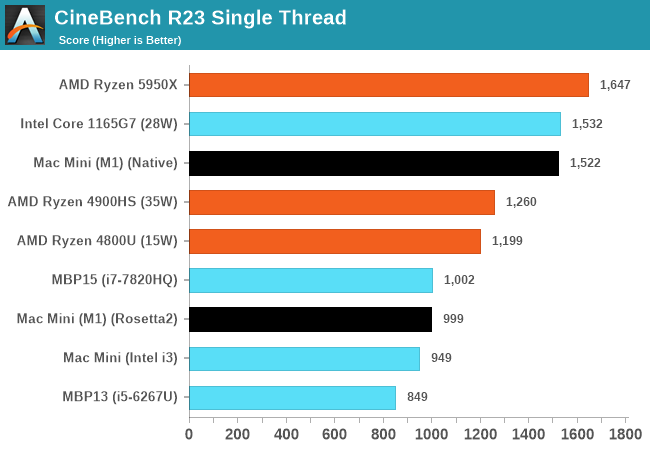
One particular benchmark that sees the first light of day on macOS as well as Apple Silicon is Cinebench. In this first-time view of the popular Cinema4D based benchmark, we see the Apple M1 toe-to-toe with the best-performing x86 CPUs on the market, vastly outperforming past Apple iterations of Intel silicon. The M1 here loses out to Zen3 and Tiger Lake CPUs, which still seem to have an advantage, although we’re not sure of the microarchitectural characteristics of the new benchmark.
What’s notable is the performance of the Rosetta2 run of the benchmark when in x86 mode, which is not only able to keep up with past Mac iterations but still also beat them.
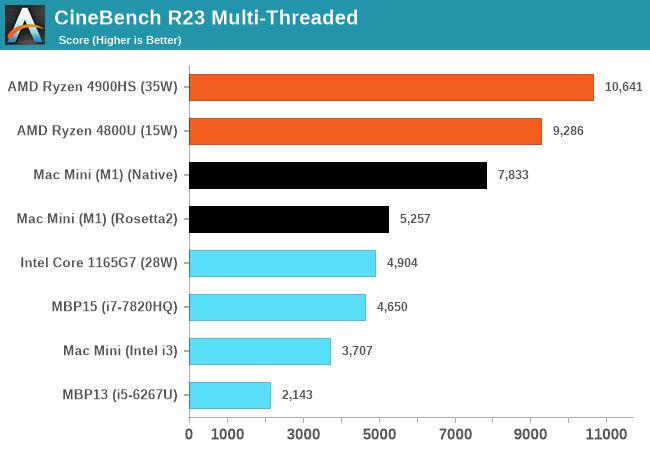
In the multi-threaded R23 runs, the M1 absolutely dominates past Macs with similar low-power CPUs. Just as of note, we’re trying to gather more data on other systems as we have access to them, and expand the graph in further updates of the article past publishing.
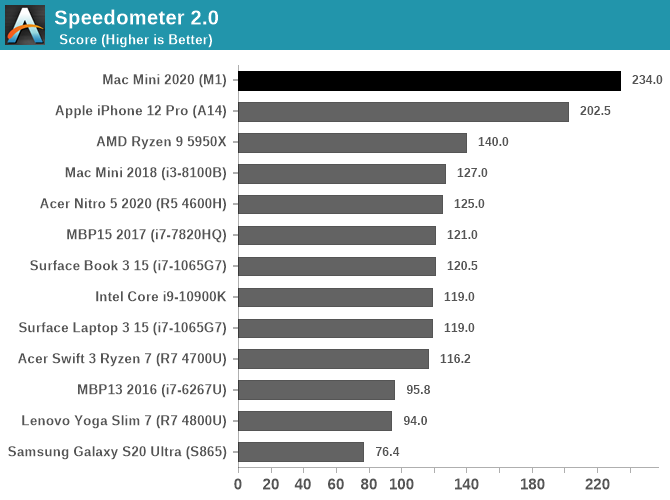
In browser-benchmarks we’ve known Apple’s CPUs to very much dominate across the landscape, but there were doubts as to whether this was due to the CPUs themselves in the iPhone or rather just the browsers and browser engines. Now running on macOS and desktop Safari, being able to compare data to other Intel Mac systems, we can come to the conclusion that the performance advantage is due to Apple’s CPU designs.
Web-browsing performance seems to be an extremely high priority for Apple’s CPU, and this makes sense as it’s the killer workload for mobile SoCs and the workload that one uses the most in everyday life.
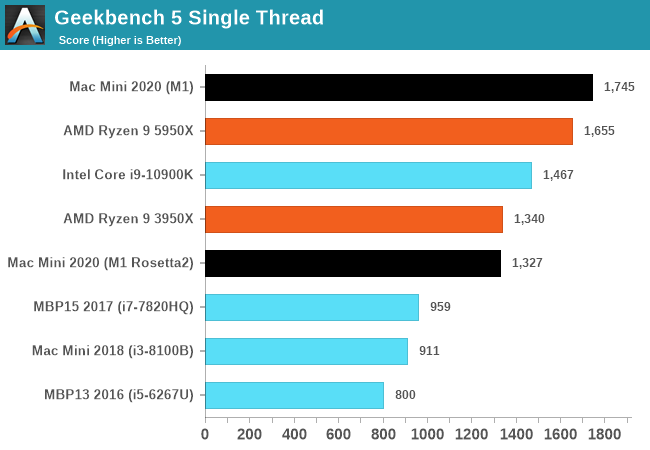
In Geekbench 5, the M1 does again extremely well as it actually takes the lead in our performance figures. Even when running in x86 compatibility mode, the M1 is able to match the top single-threaded performance of last generation’s high-end CPUs, and vastly exceed that of past iterations of the Mac mini and past Macbooks.
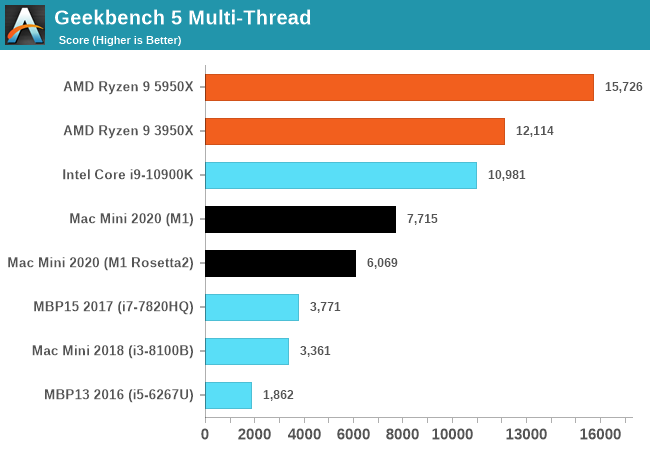
Multi-threaded performance is a matter of core-count and power efficiency of a design. The M1 here demolishes a 2017 15-inch Macbook Pro with an Intel i7-7820HQ with 4 cores and 8 threads, posting over double the score. We’ll be adding more data-points as we collect them.


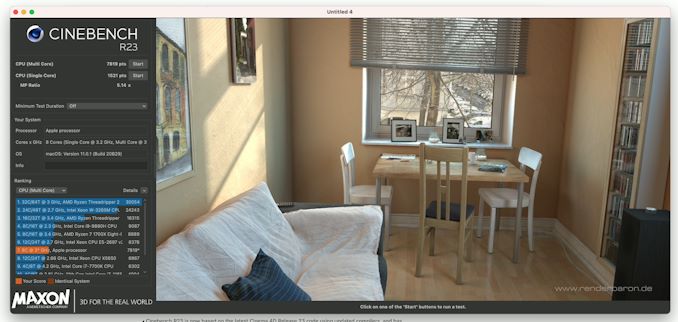








682 Comments
View All Comments
thunng8 - Sunday, November 22, 2020 - link
What are the cinebench results of the 4800u running at 15w. All I see is the 4800u running benchmark it is well over 40w.For example here: https://www.notebookcheck.net/The-Ryzen-7-4800U-is...
Power usage peaks at 57w and in games the laptop maintains 49w indefinitely. That is very very far from 15w.
Anandtech has actually test the m1 with fan in the mini and it uses 15w in cinebench and scores 7700. The non active cooled MacBook Air uses 7w when thermally throttled (this is in the 30min run) and scores approx 6000
BushLin - Sunday, November 22, 2020 - link
notebookcheck are testing a 4800U in 25W mode and stressing CPU+GPU simultaneously.Here's accurate charts of the 4800U in 15W mode.
https://www.anandtech.com/show/16084/intel-tiger-l...
thunng8 - Sunday, November 22, 2020 - link
Here is some actual figures for a Renoir system.https://forums.anandtech.com/threads/new-apple-soc...
Constrained to 25w, it score 6600.
While m1 scores 7700 at 15w.
https://twitter.com/i/web/status/13287773335122780...
The 4800u would be using 40w+ to outperform the m1 at 15w.
BushLin - Sunday, November 22, 2020 - link
Results are for a different, 4700U CPU, posted by some random person.Why not simply look at the results from the article you're leaving a comment on? Which are more likely to be taken under controlled conditions.
thunng8 - Sunday, November 22, 2020 - link
I am looking for actual performance results at 15w, not boosted to 40w or higher which all 4800u seems to do.BushLin - Sunday, November 22, 2020 - link
Didn't take much effort to find the 15W M1 and 15W 4800U have very similar power draw, if that's what you're actually looking for.They both boost above their rated power in a similar way.
https://images.anandtech.com/graphs/graph16252/119...
https://images.anandtech.com/doci/16084/Power%20-%...
thunng8 - Sunday, November 22, 2020 - link
I was looking for specific cinebench results which you alluded to was running faster than M1 while using the same power. The few videos I have seen shows the 4800U laptops fan spinning up to maximum over most of the entire Cinebench 10min run while the M1 fans (in the macbook pro) was not audible and the air has no fan at all.BushLin - Monday, November 23, 2020 - link
https://images.anandtech.com/graphs/graph16252/119...Ppietra - Monday, November 23, 2020 - link
BushLinBut those aren’t the real power draw numbers for the M1 and 4800U laptops in the tests. The 4800U 15W is just a reference, no measurements were made for the power consumption during Cinebench. The 4800U can draw much more power than 15W.
As for the Mac mini the power draw shown is for the all computer, not just the processor. If you had bothered reading thunng8 links you would see that M1 power consumption probably tops at 15W during Cinebench.
I have seen tests where a 4800U laptop consumes almost 3 times more power than a MacBook Pro with a M1 chip, during Cinebench. It’s the power consumption of the laptops not the chips but the difference is gigantic.
BushLin - Tuesday, November 24, 2020 - link
The power measurement for both systems is at the wall rather than just the SoC and the numbers available from this site, under controlled conditions, show a similar power draw under a multithreaded workload. There is a difference in depending on factors like AVX instructions but the 4800U in 15W mode is demonstrably pulling similar amounts of power to an M1 in 15W mode running a similar workload.The 4800U can be run in a higher, 25W power mode but not on the pages I've linked as it wasn't used to get the cinebench results on this article.